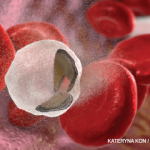“MAS is a difficult diagnosis to make [because] it can be hard to differentiate from a flare of underlying disease,” Dr. Berliner said. “However, it appears to be much more immunoresponsive than other forms of HLH, and you almost never need etoposide or transplant. Treatment of the underlying disease flare to suppress hyperinflammation remains first-line.”
Summary
Bottom line: Hematologic disorders are common in SLE, but not always due to SLE itself. Keep your differential broad, and tailor treatment to the underlying etiology, be it SLE or other.
Samantha C. Shapiro, MD, is an academic rheumatologist and an affiliate faculty member of the Dell Medical School at the University of Texas at Austin. She received her training in internal medicine and rheumatology at Johns Hopkins University, Baltimore. She is also a member of the ACR Insurance Subcommittee.
References
- Fayyaz A, Igoe A, Kurien BT, et al. Haematological manifestations of lupus. Lupus Sci Med. 2015 Mar3;2(1):e000078.
- Provan D, Arnold DM, Bussel JB, et al. Updated international consensus report on the investigation and management of primary immune thrombocytopenia. Blood Adv. 2019 Nov 26;3(22):3780–3817.
- Erkan D. Expert perspective: Management of microvascular and catastrophic antiphospholipid syndrome. Arthritis Rheumatol. 2021 Oct;73(10):1780–1790.
- Cohen H, Isenberg DA. How I treat anticoagulant-refractory thrombotic antiphospholipid syndrome. Blood. 2021 Jan 21;137(3):299–309.
- Jung H, Bobba R, Su J, et al. The protective effect of antimalarial drugs on thrombovascular events in systemic lupus erythematosus. Arthritis Rheum. 2010 Mar;62(3):863–868.
- Nuri E, Taraborelli M, Andreoli L, et al. Long-term use of hydroxychloroquine reduces antiphospholipid antibodies levels in patients with primary antiphospholipid syndrome. Immunol Res. 2017 Feb;65(1):17–24.
- Kunutsor SK, Seidu S, Khunti K. Statins and primary prevention of venous thromboembolism: a systematic review and meta-analysis. Lancet Haematol. 2017 Feb;4(2):e83–e93.
- Malec K, Broniatowska E, Undas A. Direct oral anticoagulants in patients with antiphospholipid syndrome: A cohort study. Lupus. 2020 Jan;29(1):37–44.
- Gibson C, Berliner N. How we evaluate and treat neutropenia in adults. Blood. 2014 Aug 21;124(8):1251–1258.
- Gansner JM, Berliner N. The rheumatology/hematology interface: CAPS and MAS diagnosis and management. Hematology Am Soc Hematol Educ Program. 2018 Nov 30;2018(1):313–317.

